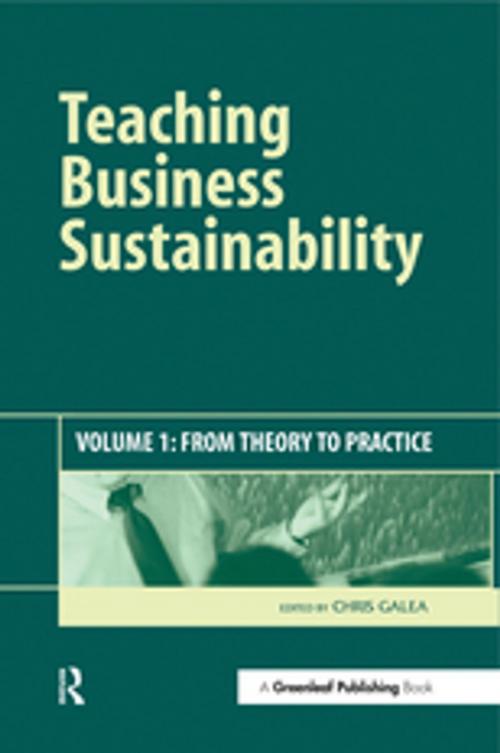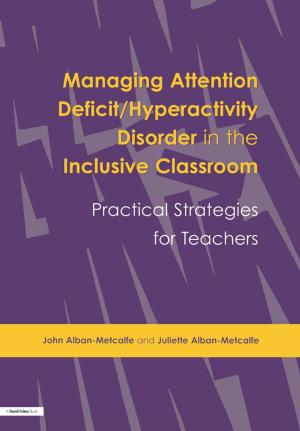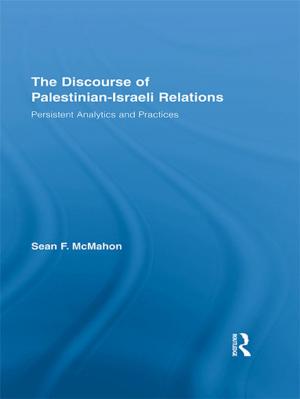Teaching Business Sustainability
From Theory to Practice
Business & Finance, Economics, Sustainable Development, Business Reference, Business Ethics| Author: | ISBN: | 9781351281782 | |
| Publisher: | Taylor and Francis | Publication: | November 28, 2017 |
| Imprint: | Routledge | Language: | English |
| Author: | |
| ISBN: | 9781351281782 |
| Publisher: | Taylor and Francis |
| Publication: | November 28, 2017 |
| Imprint: | Routledge |
| Language: | English |
In a world where corporate governance scandals have become the everyday, the role of business schools in producing the managers of today – and tomorrow – has come into sharp focus. Today's managers and the MBAs that will follow them are in need of an education that grounds business ethics and the overarching concerns of sustainable development into the curriculum. As some, but by no means all, organisations are coming to realise, bad performance in environmental protection, labour practices and human rights is no longer a "soft" issue but one that can hit the bottom line with a vengeance. So, what is the state of the art in teaching business sustainability worldwide, and what teaching practices and tools are achieving successful results? This book begins to answer these questions and more.There are many challenges facing educators in the field of sustainability. It is an evolving field still in its infancy as a management discipline; and there is also the need to combat the unstated but often underlying assumption that many environmental and social issues represent non-valued-added effort. Teaching Business Sustainability acknowledges this problem, while helping students explore the various ways in which the theoretical value of business sustainability can result in valuable and value-added practical outcomes.A wide mix of approaches is therefore indicated; while many of these are experimental and on the leading edge of management learning, they all share an experiential (and often a team-based) element, and attempt to bring together the theory in a way that makes it relevant to practitioners in the field. The implication is that, whenever possible, educators need to link the learning to the students' immediate and pressing "real-world" realities. This applies equally to undergraduates or high-level executives. However, in the absence of immediate examples of such realities (as may often be the case in undergraduate settings) educators need to introduce experientially based approaches that recreate such settings in the classroom.The book also argues the case for holistic and interdisciplinary learning. It is clear from much of the literature on sustainability that the concept does not easily lend itself to being pigeonholed and that it crosses many of the functional areas of business. Indeed, it goes beyond just business learning to encompass many fields such as ecology, engineering and biology. If students are to move beyond the narrow perspective that conventional business studies often entail, they need to be introduced to the wider vision that an interdisciplinary approach engenders.The final point that emerges from this collection is that experiential learning of business sustainability often can, and should be, fun! Be it a heated exchange in a case-study discussion, a role-play exercise or a hands-on student consulting project, much experiential learning seems to excite the imagination of the students and to release their creative juices.The 23 contributions to Teaching Business Sustainability have been divided into three thematic groups. In the first section, 'Theory, Critique and Ideas', the authors explore and critique some of the overarching ideas and thinking behind the teaching of sustainability. The next section, 'Learning from Current Practice', contains the experiences of a number of educators and the successful and leading-edge approaches that they have used. The final section then outlines tools, methods and approaches that can be used to teach business sustainability. This last section also serves as an introduction to a second volume – Teaching Business Sustainability Vol. 2 – which provides educators of sustainability with a series of case studies, role plays and experiential exercises. Teaching Business Sustainability is an invaluable resource both for educators working in a wide range of academic disciplines, looking for inspiration and guidance on how to teach business sustainability, as well as for organisations looking to reinvigorate internal management education programmes to factor in corporate responsibility and sustainability issues.
In a world where corporate governance scandals have become the everyday, the role of business schools in producing the managers of today – and tomorrow – has come into sharp focus. Today's managers and the MBAs that will follow them are in need of an education that grounds business ethics and the overarching concerns of sustainable development into the curriculum. As some, but by no means all, organisations are coming to realise, bad performance in environmental protection, labour practices and human rights is no longer a "soft" issue but one that can hit the bottom line with a vengeance. So, what is the state of the art in teaching business sustainability worldwide, and what teaching practices and tools are achieving successful results? This book begins to answer these questions and more.There are many challenges facing educators in the field of sustainability. It is an evolving field still in its infancy as a management discipline; and there is also the need to combat the unstated but often underlying assumption that many environmental and social issues represent non-valued-added effort. Teaching Business Sustainability acknowledges this problem, while helping students explore the various ways in which the theoretical value of business sustainability can result in valuable and value-added practical outcomes.A wide mix of approaches is therefore indicated; while many of these are experimental and on the leading edge of management learning, they all share an experiential (and often a team-based) element, and attempt to bring together the theory in a way that makes it relevant to practitioners in the field. The implication is that, whenever possible, educators need to link the learning to the students' immediate and pressing "real-world" realities. This applies equally to undergraduates or high-level executives. However, in the absence of immediate examples of such realities (as may often be the case in undergraduate settings) educators need to introduce experientially based approaches that recreate such settings in the classroom.The book also argues the case for holistic and interdisciplinary learning. It is clear from much of the literature on sustainability that the concept does not easily lend itself to being pigeonholed and that it crosses many of the functional areas of business. Indeed, it goes beyond just business learning to encompass many fields such as ecology, engineering and biology. If students are to move beyond the narrow perspective that conventional business studies often entail, they need to be introduced to the wider vision that an interdisciplinary approach engenders.The final point that emerges from this collection is that experiential learning of business sustainability often can, and should be, fun! Be it a heated exchange in a case-study discussion, a role-play exercise or a hands-on student consulting project, much experiential learning seems to excite the imagination of the students and to release their creative juices.The 23 contributions to Teaching Business Sustainability have been divided into three thematic groups. In the first section, 'Theory, Critique and Ideas', the authors explore and critique some of the overarching ideas and thinking behind the teaching of sustainability. The next section, 'Learning from Current Practice', contains the experiences of a number of educators and the successful and leading-edge approaches that they have used. The final section then outlines tools, methods and approaches that can be used to teach business sustainability. This last section also serves as an introduction to a second volume – Teaching Business Sustainability Vol. 2 – which provides educators of sustainability with a series of case studies, role plays and experiential exercises. Teaching Business Sustainability is an invaluable resource both for educators working in a wide range of academic disciplines, looking for inspiration and guidance on how to teach business sustainability, as well as for organisations looking to reinvigorate internal management education programmes to factor in corporate responsibility and sustainability issues.















